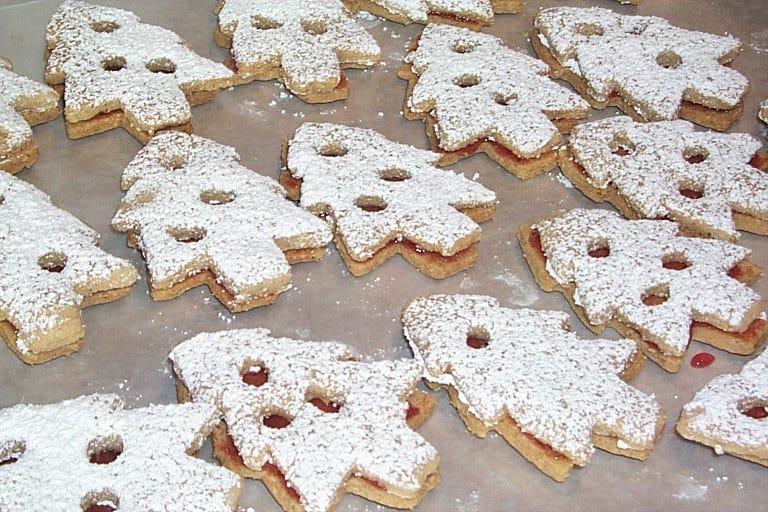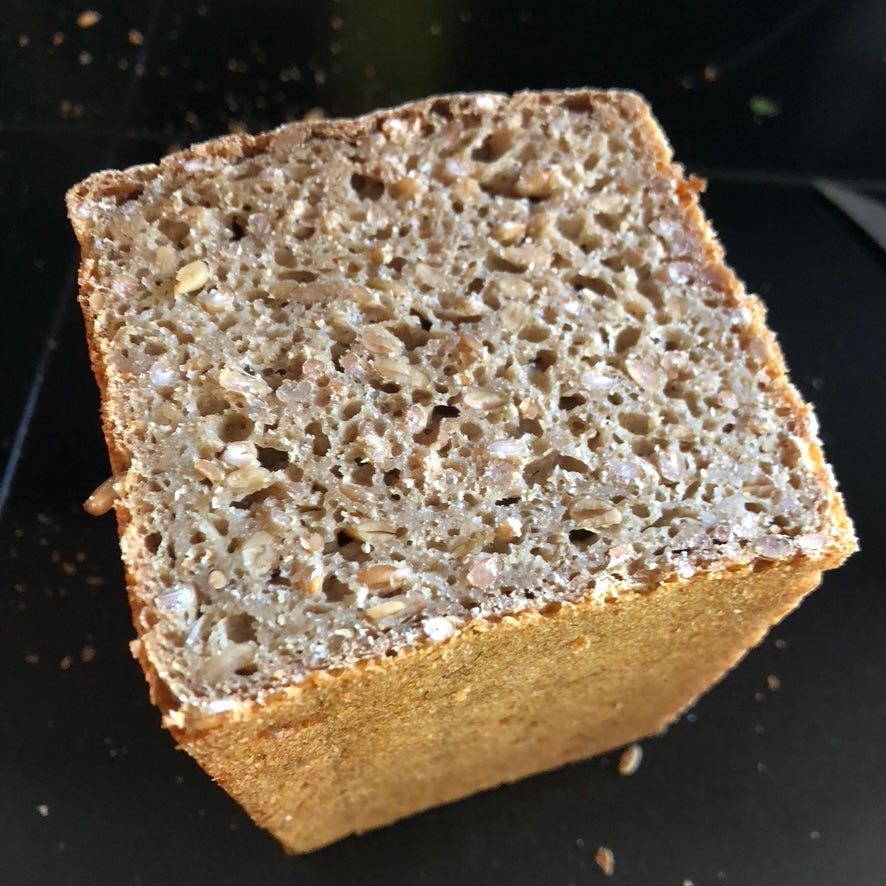This time of the year usually brings a flurry of activity to the storeroom and these shelves, but this year is different. We’re preparing to put the house on the market. Sorting through everything—deciding what stays, what goes, and what might still hold value—has prompted me to reflect on the layers of meaning tied to home, house, and place. Is home a physical structure, a collection of memories, or the connections we build within a space?
Normally, by now, our shelves and ourselves would be stuffed in preparation for the holiday open house—an overly extravagant Christmas Eve tradition that we and our friends and neighbors have come to cherish. By this time we should have baked at least three different types of cookies: Grandma Cleone’s pepparkaker, Mexican wedding cookies or almond crescents, and Grandma Dode’s birdnests, Zoë’s favorite. This year, Ken made pralines, not for the holiday, but to try to use up the many pounds of pecans in our freezer. They were delicious.
The Swedish rye bread and Danish sourdough rye loaves remain unbaked, an absence that underscores how these traditions have connected us to Ken’s and our children's’ heritage and brought warmth to our gatherings. The act of baking is always more than sustenance—it’s a way to honor our past homes and share them with people in our present one. There will be no smorgasbord, no scouring stores for herring, smoked fish, or lingonberries. I wince thinking about the carbon footprint of all that effort—driving and baking for weeks on end.
This holiday season has been spare in comparison—a season of emptying and sorting. Closets, attics, and garages have yielded their contents to various receptacles, some destined for donation to charities, others for the dump.
We’re scrubbing away the evidence of more than two decades lived here: stains from celebrations of holidays and milestones, remnants of pets who brought joy and companionship, and the markings that chronicled our children’s growth and adventures. Each trace tells a story, and erasing them feels like closing a chapter of our lives.
The walls, once colorful representations of personalities, now stand uniformly creamy white. Zoë’s room, once a vibrant purple, cluttered with pictures of horses, butterflies, dog crates, toys, and stuffed animals is an empty shell of its former self.
Søren’s once bright blue accent wall is gone, as are the quirky Banksy-inspired art he purchased for his walls as an adolescent.
Søren, arriving “home” yesterday, seemed disappointed by the lack of holiday decor—no giant well-lit Christmas tree or stockings hung by the chimney with care—a prominent feature of our home from Santa Lucia’s feast day until Epiphany. He pointed out the pencil markings on his closet trim that tracked his growth from the time we moved into this house when he was three. The last mark, at age fifteen, memorializes his becoming more man-like. How can I erase that? It feels sacrilegious.
Is this still our home? Was it ever? Or has it always been just a house, a long spell in one place? These questions linger as I recall a conversation with my aunt a few weeks ago.
“You’re going to have your holiday open house, aren’t you?” she asked.
“No,” I said, “Not this year.”
She frowned, her lips tight. “You’re kidding, right? People are depending on you.”
“You aren’t really mad, are you?”
“You have to do something—it just isn’t fair to all of your friends. They’ll expect to have a good-bye party.”
“We’ll do something,” I said, “just not our Christmas Eve open house.”
Until then, I hadn’t considered that this house, our home, might be a part of a what makes Portland home for others.
As the storeroom empties, I second guess myself. Are we making a mistake in leaving now? I shake the thought. We need more light, more sunshine.
I’ve lived here longer than anywhere else, and in this house longer than any other. Yet somehow, I feel as if I’m going home, not leaving it. We will miss this house, the community, the friends. But these are things we carry with us. Next year, we’ll put up a tree in our new house. We’ll celebrate there, with different guests. This year, we’ll forgo the conspicuous consumption that has long marked December.
For our children, this will be the first Christmas without a tree or an opulent exchange of gifts. It won’t be the first for me.
When I was eight, my family was “unhoused” for a the better part of a year. We didn’t use that word then. My mother called it being on an adventure. We lived in a tent for four months—camped throughout Colorado, the northern United States and up into Canada as far as Nova Scotia. We drove down the coast from there to Sandbridge, Virginia Beach where we lived in a beach house that belonged to a family friend.
We had more varied resources than most who find themselves on the streets today, and gratefully a healthy non-drug addicted parent too, but we had very little money, and my mother had taken to the road with us out of desperation. The only money she had came from my father’s meager child support payment, which was scarcely enough to feed us, let alone house and clothe us, but she was a survivor. She knew how to build a fire to keep us warm, and how to make delicious meals on a camp stove out of next to nothing. And, she was good at fishing, which she taught us to do. On the camping portion of the trip there were many days where we ate trout for breakfast, lunch and dinner. At the beach fruits of the sea replaced trout, mostly blue crab caught in the bay, or gleaned from the fishermens’ nets.
My siblings and I have differing memories and experiences of that time, but we all agree that the “camping trip,” as our mother often referred to it, and living at the beach were some of the most memorable and magical days of our lives and childhoods, especially the Christmas that we passed at the beach, a Christmas which did not involve a decorated house, an exchange of gifts, nor a tree.
That year of not having our own place to live taught us about reliance on each other, the help and gifts of strangers, friends, and neighbors. I learned that home is neither the house nor the place where one lives, but is where people we love reside.
Perhaps, this is why leaving doesn’t frighten me. I’m leaving people I love, and moving toward others I have cared about during my entire life.
The cliché “home is where the heart is” rings true, but for me, it’s bigger than that. Home lives in our memories, in the places and people who shape us over time. Neither houses, nor geographic locations contain the concept of home; it’s embodied in a collective story that we live in space and time.
Wishing you a happy holiday season no matter where you may find yourself.







Great post Anne. (I shared it). I love that you describe the experience of leaving a house after 20 years, as it makes me think a lot about the two houses I live in, that I love, and what it would mean to leave them. You are doing it smartly - the way I would want. With a little nostalgia, no soppy sentimentalism…
Beautiful Anne!